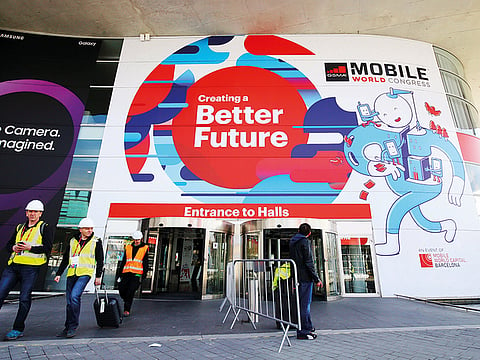LG focuses on AI rather than flagship launch
V30S is an upgraded version of last year’s model

Barcelona: South Korean smartphone manufacturer LG has a different strategy this year and opted not to launch its next flagship at Mobile World Congress 2018.
Instead, it released an Artificial Intelligence (AI) -powered version of last year’s V30 model and named it V30S, focusing more on optimising returns for each model.
LG is expected to launch its next flagship G7, or Judy, in June.
The company launched a suite of AI tools, covering image processing and voice recognition similar to Apple’s Siri, Google’s Assistant and Samsung’s Bixby. It is not launching its own dedicated AI assistant; LG is adding nine new exclusive voice commands to Google Assistant this year to go with the 23 that already work.
Ian Hwang, director of product portfolio, said that LG’s ThinQ internet of things platform, which was debuted at Consumer Electronics show at Las Vegas, was introduced to identify all of LG’s home appliances, consumer electronics and services that use artificial intelligence. It will be incorporating more internet of things devices to the Thing Q platform.
The V30 has no major changes in hardware and it stuck to last year’s Qualcomm 835 chipset with 18:9 QuadHD+ OLED FullVision Display with 6GB of RAM and 64/128/256GB of ROM. The rear camera houses 16MP f1/6 aperture camera and 13MP f1/9 wide angle while the front-facing camera sports 5MP with f/2.2 wide angle.
The V30S+, which was launched in the Middle East last year with the same features as V30S, is getting the internal storage capacity raised to 256GB instead of 128GB.
LG’s Vision AI analyses objects and recommends the best shooting mode from among eight modes: portrait, food, pet, landscape, city, flower, sunrise, and sunset. The angle of view, colour, reflections, backlighting, and saturation levels are all taken into consideration as the phone analyses images in its database to determine what the camera is focusing on in order to recommend the best setting. Over 100 million images were used to create the algorithms.
Another new feature is Voice AI, which allows users to run apps and change settings through voice commands alone. Working alongside Google Assistant, the 32 LG-exclusive Voice AI commands up from 23 commands in 2017. Voice AI eliminates the need to search through menu options and allows for direct selection of specific functions.
Another feature of Vision AI provides shopping advice through smart image recognition. By simply pointing the camera at an object, LG’s Vision AI can automatically scan QR codes, initiate an image search or provide shopping options including where to purchase the item for the lowest price and other similar products that the customer might find of interest.
Sign up for the Daily Briefing
Get the latest news and updates straight to your inbox



